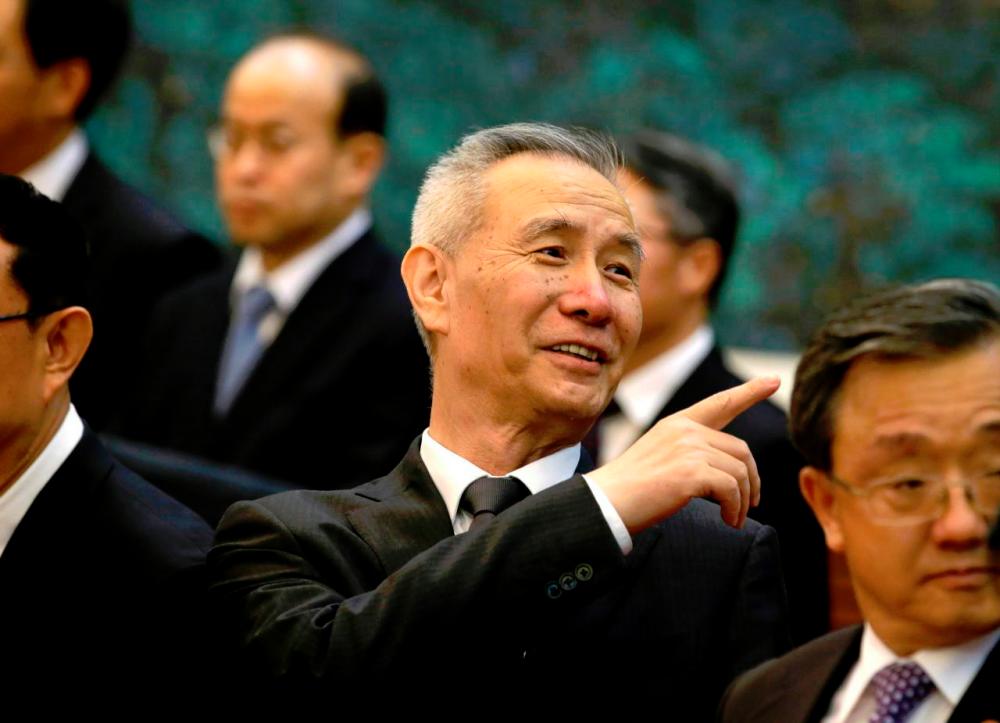BEIJING: China’s top trade negotiator will travel to the United States for talks later this month ahead of a March deadline to avoid bruising tariff hikes, the commerce ministry said Thursday.
Vice Premier Liu He will visit Washington on January 30-31 for the negotiations, the ministry said, following up on talks between lower-level officials in Beijing earlier this month.
President Donald Trump and Chinese leader Xi Jinping agreed to a three-month trade war truce in December, suspending US plans to increase tariffs on Chinese goods to give negotiators space to find a solution.
Liu and US officials will “hold negotiations on economic and trade issues and work together to push forward and implement the consensus” reached by Xi and Trump, ministry spokesman Gao Feng told reporters.
But Liu’s trip could run into complications after reports of fresh legal trouble in the United States for Chinese telecom giant Huawei.
US authorities are in the “advanced” stages of a criminal probe that could result in an indictment of the company, The Wall Street Journal reported on Wednesday.
Citing anonymous sources, the paper said the Department of Justice is looking into allegations of theft of trade secrets from Huawei’s US business partners, including a T-Mobile robotic device used to test smartphones.
Canada’s arrest of Huawei’s chief financial officer Meng Wanzhou, who is the daughter of the company founder, at the request of the United States has already infuriated Beijing.
Two Canadians have been detained in China since Meng’s arrest and a third has been sentenced to death on drug trafficking charges – moves observers see as attempts by Beijing to pressure Ottawa over her case.
Huawei, the second-largest global smartphone maker and biggest producer of telecommunications equipment, has for years been under scrutiny in the US over purported links to the Chinese government.
Record surplus
US officials have said that last week’s talks in Beijing “went just fine” but few details from the meeting have emerged.
Liu will travel at the invitation of US Treasury Secretary Steven Mnuchin and US Trade Representative Robert Lighthizer, Gao said.
Washington has been clamouring for an end to the forced transfer – and even theft – of American technology, as well as steep government subsidies for Chinese companies.
The Trump administration also wants Beijing to buy more American goods to narrow a yawning trade gap and allow foreign players better access to the Chinese market.
China’s trade surplus with the United States hit a record USD $323.3 billion (RM1.3 trillion) in 2018, Chinese customs data showed on Monday.
However, in a sign that the White House’s measures are having an impact, China’s exports to the US sank in December.
The Trump administration has imposed tariffs on USD $250 billion (RM 1 trillion) worth of Chinese imports, prompting Beijing to hit back with duties on $110 billion in US products.
Without a resolution, punitive US duty rates on $200 billion in Chinese goods are due to rise to 25% from 10% on Mar 2.
Economic trouble
While China grapples with a trade war, its economy has been slowing down.
The government has targeted growth of around 6.5% this year, down from 6.9% in 2017 and at its weakest in almost three decades.
China will release its 2018 GDP growth data on Monday. Recent data point to a slowdown.
Annual passenger car sales fell last year for the first time in more than 20 years, as the trade war with the US rocked consumer confidence and Beijing reined in car financing channels.
And the cost of producing goods in China’s factories slowed sharply in December, a sign demand remains weak, while consumer inflation also flagged.
Official data showed the manufacturing sector contracted in December for the first time in more than two years. — AFP














